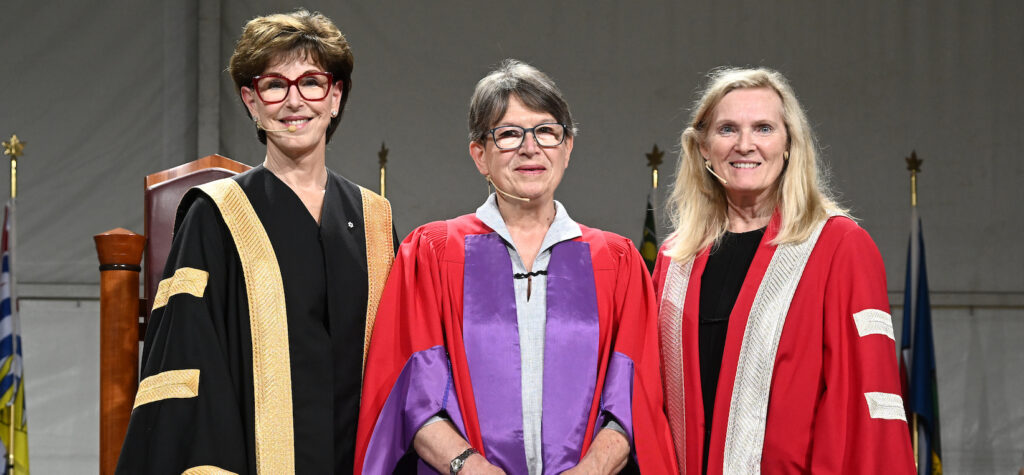
Graduands of Glendon College crossed the stage on June 9 as the first cohort of York University's Class of 2023 during this year's Spring Convocation.
During the first of 12 ceremonies planned through June, Glendon graduands had the opportunity to hear from York University's newly installed chancellor, Kathleen Taylor, as well as from honorary degree recipient and Glendon alum Joan Andrew.
Taylor first addressed the graduating class with an inspirational message to foster connections, to give back and to embrace failure as a stepping stone toward success.
"Your hard work, determination and perseverance have all paid off and succeeded in completing your degrees. And, what a massive feat this is," said Taylor, who is also a York alum. "As you embark embark upon this next exciting chapter of your lives, remember that success is not a destination, but a continuous journey of learning and growth. So embrace change, seize opportunities, adapt and evolve. And continue to strive for excellence for yourself, for those in the world around you."

Andrew, who spent more than 35 years in public service working for the federal and provincial governments, shared her personal journey with graduands, as well as their families and friends, after receiving an honorary doctor of laws.
Graduating from Glendon more than 50 years ago with a BA majoring in sociology, Andrew recalled one of the most important experiences during those years was the friendships she made, noting that some of her closest friends today she met at Glendon.
After completing her studies at Glendon, Andrew spent a year combining work and travel in Europe before settling in Toronto and accepting a six-week contract with the federal government, where she ended up working for 15 years. Most of her career, she shared, was spent working on issues of employment and labour market policy, but also focusing on working with community organizations to work on improving employment and training, women's issues, immigration and refugee matters and environmental issues.
"I think this experience also created a focus for my career in terms of trying to figure out how governments could design policies and programs to better serve people historically not well served by governments. I know much more remains to be done – particularly in the context of reconciliation with Canada’s Indigenous communities and the pervasiveness of racism, and other forms of discrimination and exclusion – but there has been some progress in the last 40 or 50 years," she said.
"I hope as you choose your career path or paths that you think seriously about some form of public service, whether in governments at different levels, in the community sector or in education or health related fields."
Her path then led her to the British government for a year, and then back to Ontario to take on a role at the Ontario Women’s Directorate leading a branch that was responsible for promoting employment equity for women. From there, she led policy development on women's issues with an emphasis on partner and sexual violence, and three years later became an assistant deputy minister in the Ontario Public Service, taking on a variety of roles.
In 2005, Andrew became deputy minister and was responsible for the Ministry of Citizenship and Immigration, the Ontario Women’s Directorate and briefly for the Ontario Seniors Secretariat. The government’s priority at that time, she said, was to improve the prospects for newcomers to Ontario to work in their chosen field and to gain access to regulated professions. While in this role, the government introduced legislation with the support of all parties to create an act initially called the Fair Access to Regulated Professions Act, said Andrew, adding that it was later amended to include compulsory trades.
"Ontario was the first province in the country to introduce this kind of legislation and while progress has not been as significant as some of us might have hoped, there have been some amendments to tighten some provisions and some professions have made significant improvements, there is still much to be done to support newcomers access to their chosen careers and recognition of their credentials," she said.
Andrew retired from Ontario Public Service in 2009 to focus on volunteering with the United Way of Greater Toronto and with TRIEC, the Toronto Region Immigrant Employment Council. She also spent some time as the public servant in residence at what is now Toronto Metropolitan University, and helped master's level students find work placements in public service.
In 2015, Andrew took on a special project in the Ontario Cabinet Office to address a cross-government approach to the arrival of the refugees from Syria, and to work on better coordination with the federal government. This involved addressing housing issues for the arriving refugees – both short and long term – as well as health care services, including vaccinations, so the children could go to school; English-as-a-second-language training for the adults; getting the children into school, supporting sponsorship groups; and addressing refugee mental health issues.
"It was a challenging but very rewarding project and tied in with my personal interests, as I was part of a sponsorship group that helped three families come to settle in Toronto," she shared.
"There are many ways to be involved in public service on both a professional and voluntary level. There can be lots of challenges, but it can be exciting and fun too. Think about public service as you choose your career."
Visit the Convocation website for more on upcoming ceremonies.
